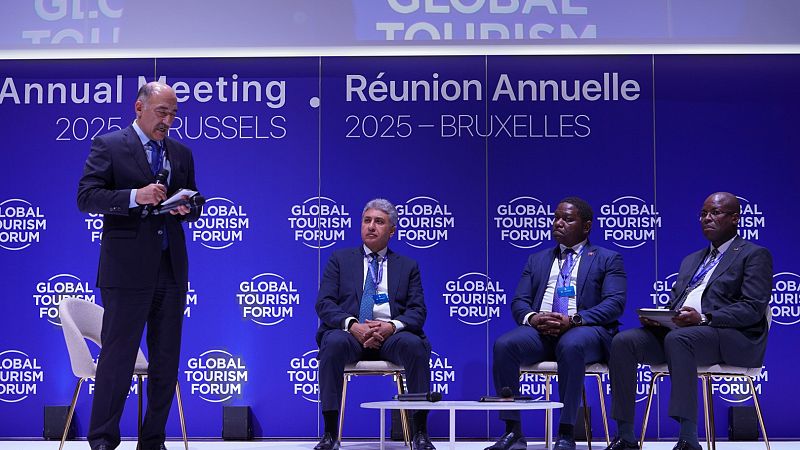Angola, Mozambique and Egypt advocate greater cooperation to promote tourism in Africa

Tourism leaders from Angola, Mozambique and Egypt have argued that there is a need to strengthen cooperation and strategic investment in tourism in Africa, in a panel discussion at the Global Tourism Forum.
The session, entitled "Africa Ascending: Tourism for Infrastructure, Youth Employment, and Investment Attraction", brought together African tourism leaders, including Márcio de Jesus Lopes, Angola's Minister of Tourism; Sherif Fathy, Egypt's Minister of Tourism and Antiquities, and Mozambique's Secretary of State for Tourism, Fredson Bacar. The panel was moderated by Abulfas Garayev, Azerbaijan's former Minister of Culture and Tourism (2006-2018).
During the conversation, the three participants explored the economic impact of tourism, its role in job creation and the importance of developing tourism infrastructure in Africa to attract sustainable investment.
Among the points on which they converged was the need for more in-depth regulation to reach an agreement on "open skies" on the African continent, as well as facilitating the free movement of people, without requiring an entry permit or visas between African countries, similar to what happens today in Europe in the Schengen Area.
In his opening remarks, moderator Abulfas Garayev explained how Africa received 74 million tourists in 2024, representing a 7 per cent increase compared to pre-pandemic levels and a 12 per cent increase compared to 2023.
Projections indicate that the number of tourists will reach 82 million in 2025, reflecting the strongest post-pandemic recovery in the world.
Angola says investment in connectivity is fundamental
Angola's Minister of Tourism, Márcio de Jesus Lopes, urged African nations to strengthen co-operation and strategic investment to transform tourism across the continent. He insisted that collaboration, not competition, should guide Africa's approach to tourism development.
Jesus Lopes emphasised the need to invest in infrastructure and connectivity as fundamental pillars for the advancement of the sector and for mobility, particularly with regard to the creation of airports, seaports, roads and electrification.
"Africa must move beyond the logic of competition and embrace co-operation between nations, based on regional success stories," he said.
"We must learn from each other and form a strong bloc that positions Africa as a leading global destination."
He also emphasised that the true measure of success in attracting foreign investment lies in ensuring that profits are reinvested locally to generate employment and sustain growth.
The Angolan minister mentioned the country's national tourism development strategy, which is supported by major structural projects, including the newly operational Dr António Agostinho Neto International Airport, the Convention Centre under construction in Luanda, and the Lobito Corridor, which links the port of Lobito in Angola to the mining regions of the Democratic Republic of Congo and Zambia.
These initiatives, he noted, "will strengthen regional integration, boost tourism and attract foreign direct investment".
Mozambique and sustainable tourism
In the discussion with the other speakers, Mozambique's Secretary of State for Tourism, Fredson Bacar, emphasised the importance of implementing environmental sustainability in the tourism sector as a way of ensuring its rapid development.
Recalling that the country was also recognised this week as the world's Best Sustainable Tourism Destination at the World Tourism Awards 2025 gala in Brussels, he pointed out that the use of natural resources in a sustainable way, more than guaranteeing tourism, creates jobs and investment in the country, helping local communities.
With regard to job creation, he emphasised the importance of establishing"partnerships with private sector companies to employ local young people", who make up the largest part of the Mozambican population.
He also pointed out that Mozambique faces inherent challenges due to the size of its territory.
"It's impossible to create infrastructure and develop the whole country at the same time, we have 2,700 kilometres of coastline and 25 per cent of the territory is in nature conservation areas," he explained.
According to the minister, this also creates obstacles to investment in the creation of tourist areas, since there are regulations regarding the requirements for investors in terms of environmental sustainability that have to be respected.
Egypt as a success story
Sherif Fathy, Egypt's Minister of Tourism and Antiquities, also highlighted the main challenges facing tourism development across Africa, particularly in areas such as air connectivity, the development of human capital and investment in infrastructure.
The minister considered Egypt a success story in the expansion of the tourism sector, pointing to the government's major investments in infrastructure, including roads, railways, airports and transport networks linking important tourist destinations.
He highlighted the north coast region as an example, which saw a "500 per cent increase in air traffic this summer", supported by three airports currently being expanded to meet growing demand.
He also emphasised the importance of combining academic training with practical internships in tourism and hospitality, stressing the importance of initiatives to prepare qualified young professionals through partnerships with international institutions.
As an example, he pointed to the recent inauguration of a hotel school in Hurghada, developed in co-operation with a European partner, to train young people for employment in the tourism industry.
Sherif Fathy emphasised that Egypt's current tourism strategy involves focusing on different products and areas, from cultural and heritage tourism to beach, desert and eco-tourism.
The aim, he said, is for Egypt to become "the world's leading tourist destination in the coming years given its unrivalled variety of experiences".
He also stressed the need for innovative marketing tools, pointing out that "artificial intelligence now plays a vital role in understanding travellers' interests and tailoring tourism products to specific segments of the public".
Today

